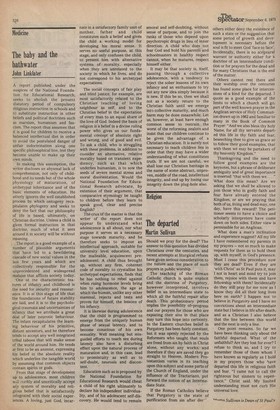Religion
The departed
Martin Sullivan
Should we pray for the dead? The answer to this question has divided Christians over the centuries, and recent attempts at liturgical reform have given serious consideration to the nature and the place of such prayers in public worship. The teaching of the Roman Catholic church is quite explicit and the doctrine of Purgatory, however interpreted, involves belief in an intermediate state to which all the faithful repair after death. This probationary period implies the possibility oPprogress and our prayers for those who are expiating their sins in that place may turn this hope into certainty. In the Eastern churches belief in Purgatory has been fairly constant, but it was openly rejected by the Reformers who taught that souls are freed from sin by faith in Christ alone, without any works, and therefore if they are saved they go straight to Heaven. Modern Protestantism varies in its teaching upon this subject and some parts of the Church of England, under the influence of the Tractarians, put forward the notion of an Intermediate State.
If the Roman Catholics believe that Purgatory is the state of purification from sin after der"
Opeetathr,September 6, 1975
others either deny the existence of such a state or the suggestion that some period of growth and development is necessary before the soul is fit to meet God 'face to face'. Incidentally, there is no scriptural warrant or authority either for a doctrine of an intermediate condition or for prayers for the dead and for many Christians that is the end of the matter. Others cannot rest there and their worship over the centuries has found some place for intercessions of a kind for the departed. I quote as a good example of the limits to which a church will go, part of the well known prayer in the Anglican service of Holy Communion drawn up in 1662 and familiar to many in the Book of Common Prayer: "And we also bless thy holy Name, for all thy servants departed this life in thy faith and fear; beseeching thee to give us grace so to follow their good examples, that with them we may be partakers of thy heavenly Kingdom." Thanksgiving and the need to follow good examples are the keynotes, but a phrase of deliberate ambiguity and of great importance is inserted: 'that with them we...." What does this mean? Are we asking that we shall be allowed to join those who in godly faith and fear have already entered the Kingdom, or are we praying that both of us, living and dead may, one day, have this reward? The petitioner seems to have a choice and scholarly interpreters have come down on both sides. Either view is permissible for an Anglican. What does a man's inclination and experience suggest? All my life I have remembered my parents in my prayers — not so much to make requests for them as to hold them up, with myself, in God's presence.
Must I cease this procedure now they are dead? Even if they are 'with Christ' as St Paul puts it, may I not in heart and mind try to join them, rejoice with them and have fellowship with them? Incidentally do they still pray for me now as I
know they did all their long lives here on earth? I happen not to believe in Purgatory and I have no
convictions about an intermediate state but I believe in life after death, and as a Christian I also believe that the line between this world and the next is only a line.
• One point remains. So far we have been thinking only about the faithful departed. What of the unfaithful? Are they lost for ever? I refuse to think so, and I try to remember those of them whom I have known as regularly as I hold in my prayers those who have departed this life in religious faith and fear. "I came not to call the righteous but sinners to repentance," Christ said. My limited understanding must not curb His universal love.
'"-a-tin Sullivan is Dean of St Paul's


































 Previous page
Previous page